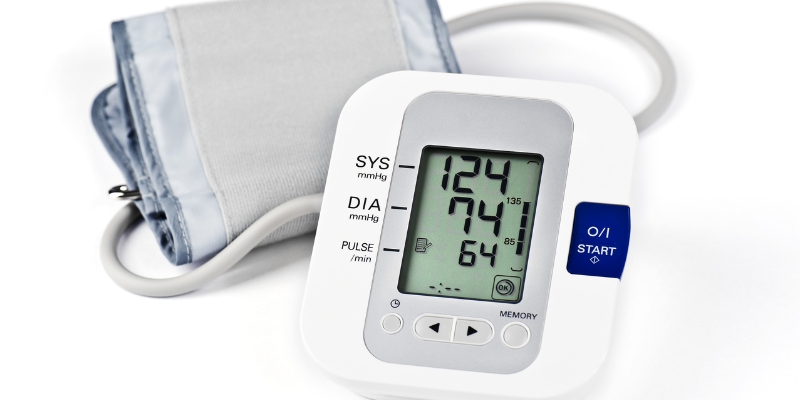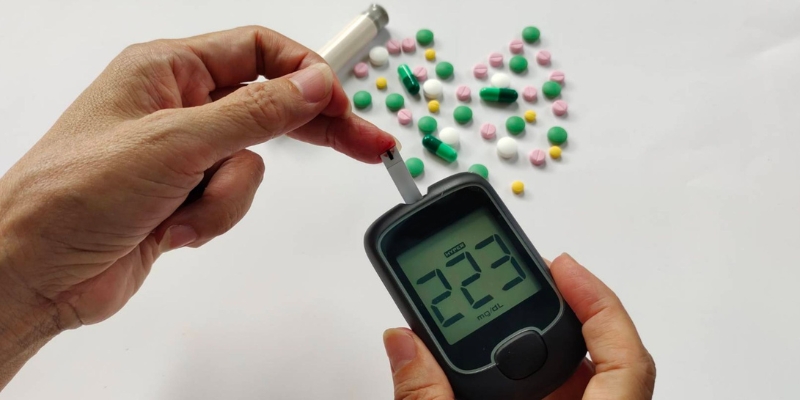Blood pressure is a crucial cardiovascular indication. It shows how well our heart pumps blood through our arteries and predicts our risk of heart disease, stroke, and other health issues. People are realizing the benefits of home blood pressure monitoring, usually done in the doctor's office. This extensive post will discuss the compelling benefits of home blood pressure monitoring. We'll examine its benefits, who should consider it, how to choose a blood pressure monitor, how to test it, and how to interpret your data. You'll grasp the importance of home blood pressure monitoring at the end.

Understanding Blood Pressure:
Uncontrolled high blood pressure may harm your health. Understanding this condition's complications is crucial. Hypemost significant is the biggest risk factor for heart disease, stroke, and renal disease. Maintaining high blood pressure strains your arteries, making them less elastic and more susceptible to injury. This may cause atherosclerosis, fatty deposits in your arteries that limit or obstruct blood flow, raising your risk of heart attacks and strokes.
Regular Monitoring: Given the health hazards, blood pressure monitoring is crucial. Monitoring your blood pressure at home is convenient and may identify changes early. By managing your blood pressure proactively, you may reduce the risk of significant problems and improve your quality of life.
Setting Up Your Home Monitoring Routine:
Choosing the Right Time: Blood pressure readings may be affected by time. Take measurements at the same time every day for consistency. Many doctors advocate checking blood pressure before breakfast and supper. Physical exertion and stress may temporarily raise blood pressure, so choose a calm time.
Blood pressure monitoring frequency varies depending on your circumstances. Your doctor may urge daily or weekly monitoring if you have hypertension or are taking new drugs. Monitoring several times or once a week may be enough for well-controlled blood pressure. Tracking changes over time requires consistent measurement timing and frequency.
Tracking Medication Effectiveness:
Medication Management: Hypertensives need drugs to control their blood pressure. Home monitoring helps assess these drugs' efficacy. You can follow blood pressure trends at home by measuring it often. Your doctor may change your therapy if your blood pressure stays high after medication.
Collaboration with Healthcare Providers: Medication management involves good communication with your doctor. Share home monitoring data during medical visits or telehealth. This lets your doctor evaluate your medicines, adjust doses, or try new blood pressure therapies.
Lifestyle Modifications and Blood Pressure:
Exercise and diet are essential to blood pressure regulation. Diet and exercise are crucial to blood pressure health. A heart-healthy diet of fruits, vegetables, whole grains, and lean meats lowers blood pressure. Regular brisk walking or cycling may also decrease blood pressure and enhance cardiovascular health. Diet and activity adjustments must be discussed with your doctor to ensure they fit your treatment plan.
Stress Reduction: Chronic stress raises blood pressure. Supplementing medication and lifestyle modifications with stress reduction may be helpful. Mindfulness meditation, deep breathing, and yoga may reduce stress and improve blood pressure regulation. Add these practices to your routine to improve your health.
The Future of Home Blood Pressure Monitoring:
Technology: New home blood pressure monitoring technologies improve user experience. Smartphone applications let people easily sync blood pressure data. Some monitors use AI algorithms to improve accuracy and identify abnormalities. Home surveillance may become more accessible as technology advances.
Personalization is the future of blood pressure treatment. With more home monitoring data, doctors can customize treatment programs. Personalized hypertension management may improve blood pressure control, reduce complications, and improve quality of life.
Who Should Monitor Blood Pressure at Home?
Home blood pressure monitoring should not substitute for regular doctor visits. Instead, it enhances average doctor visits to understand blood pressure patterns better. Your doctor may propose customized monitoring frequencies if you have a medical problem or use hypertension medication. Home blood pressure monitoring helps people to control their cardiovascular health proactively.
Choose the Right Blood Pressure Monitor: A Step-by-Step Guide
Home monitoring requires selecting the correct blood pressure monitor. Consider if you need an upper-arm or wrist blood pressure monitor. Upper-arm monitoring is more accurate, while wrist monitors are more portable. After choosing the kind, choose a trustworthy device. Find monitors certified by recognized organizations like the AHA or BHS.
Also, consider cuff size, display readability, and usability. Since you'll use the gadget often, comfort and convenience are key. Remember that cuff size affects reading accuracy; therefore, measure your arm circumference. Finally, choose between a simple model with fundamental measures and a more complex one with numerous user profiles, memory storage, and smartphone connection. Your pick should suit your requirements and tastes. After choosing a blood pressure monitor, you must learn how it works and ensure it fulfills validation requirements for reliable results.
Home Blood Pressure Testing: The Art of Precision
Proper testing is essential for accurate home blood pressure readings. Start in a quiet area because noise and distractions might impact your reading. Caffeine and strenuous exercise may raise blood pressure, so rest and avoid them 30 minutes before testing. Put the cuff on your naked upper arm snugly but not too tight. Place your arm flat at heart level. Multiple readings with a short pause interval are needed to capture findings. This accounts for fluctuation and improves blood pressure accuracy.

Blood Pressure Numbers: What Do They Mean?
Knowing your blood pressure is essential for monitoring. Systolic and diastolic blood pressures are measured. The more prominent figure indicates the force of blood against artery walls while your heart beats, whereas the lower number shows the pressure between beats. Normal blood pressure is 90/60 to 120/80 mm Hg.
Importantly, stress and physical exercise may cause blood pressure to vary throughout the day. Occasionally, elevated results are not alarming. However, chronically high readings may need therapy intervention or correction. Record your measures and discuss them with your doctor during frequent checkups. They may help you understand your blood pressure patterns and make treatment and cardiovascular health choices.
Conclusion:
Home blood pressure monitoring has several benefits and may help many people. Home monitoring may give valuable information if you have hypertension, risk factors, or wish to manage your health. It allows you to manage your cardiovascular health and supplements routine medical checkups. You can protect your long-term health by knowing and monitoring your blood pressure.







